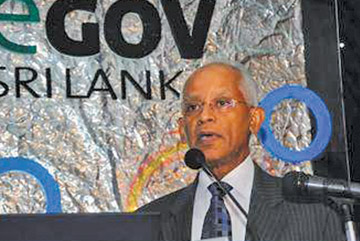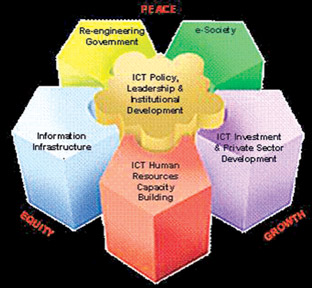|
Innovations improve quality of life:
Peace spurs development
Speech delivered by Secretary to the President
and UNESCAP ICT Committee Chairman Lalith Weeratunga at the ‘FutureGOV
Forum - Sri Lanka’ on October 28, 2010 in Colombo
“It is indeed a great pleasure to address you on a topic that is of
great value to the current development impetus Sri Lanka is enjoying. I
thank the organizers of this timely event FutureGOV Forum for selecting
Sri Lanka. This ratifies in more ways than one the global reputation Sri
Lanka is enjoying as a fast developing nation.
|

Secretary to the President and UNESCAP ICT Committee
Chairman Lalith Weeratunga addressing at the ‘FutureGOV
Forum - Sri Lanka’ |
“Just about two years back, not many in the international arena would
have given Sri Lanka the slightest chance of defeating the most ruthless
terrorist outfit and becoming the best and destination for people to
travel to and enjoy a vacation of their lifetime. President Mahinda
Rajapaksa gave a firm and stable, yet unprecedented leadership, to a
well co-ordinated process to do the unbelievable. That is why Sri Lanka
once again after 25 long years has been able to showcase some of its
strengths and innate treasures in the form of serenity and unmatched
tranquillity.
ICT for development
“The serenity and peace that has dawned in our Motherland has enabled
us to think of innovations that would improve the quality of life of
those living in rural areas, hitherto not much noticed by the
policymaker, disadvantaged groups, students, senior citizens, the
entrepreneur and all other segments of the society. This Forum that
comprises many who are envisioning dimensions of future Governments
across the globe would share with us today and tomorrow what they have
been doing in their countries to improve the quality of life of their
people. I am sure we too could share all or some of our successes in ICT
for development.
|
Economic growth |
* Strong political leadership
* Robust Government
* Citizens as partners of Governance
* National competitiveness
* Increasing ICT literacy
* Skills development |
“My task this morning as agreed with the organizers would be to
briefly say what “eSri Lanka is and then to showcase how we hope to
build Sri Lanka’s economy utilizing ICT. I would like to add some
thoughts on a few salient areas including governance, leadership and ICT
for development. I will not dwell at length on eGov as many technical
aspects of eGovernment will be discussed by many distinguished
presenters from both overseas and Sri Lankan organizations.
Infrastructure development
“Infrastructure development and knowledge-based economic development
are priorities of Sri Lanka’s development agenda in which ICT would be
used to spur growth and propel socio-economic development of the
country. In that context, I must touch upon four key areas:
*Citizens as partners of gover nance through ICT.
*Commitment of the top-level political leadership for enhancing
national competitiveness.
*Increased use of ICT to bridge rural-urban divide for improved
quality of life.
*Making Government robust and efficient through Re-engineering
Government.
|

eSri Lanka Development Model (ICTA) |
“Of these, the most critical area to me is how much we could make
Government robust and efficient for that is one area that can make
economic growth impact. Before, I venture to elaborate my thoughts on
these, I would like to briefly talk about the eSri Lanka program. The
most interesting aspect of eSri Lanka program is that it is all
encompassing, it is not just improving the way Government works, or
eGovernment. It’s about improving people’s lives all round.
Its cornerstones, peace, equity, and growth remain valid even today,
much long after it was conceptualized.
*Peace was a main demand of all the citizens of Sri Lanka,
irrespective of ethnic differences. President Rajapaksa had as his top
priority, sustainable peace that accommodates interests of all
communities. As he has enunciated, “there is no development without
peace and no peace without development.” That is why he spearheaded the
campaign to eradicate terrorism and simultaneously initiated overall
development throughout the country. There are no precedents in the world
on this score. The mutual dependency of peace and development has been
well understood.
*Equity was the second pillar on which eSri Lanka was built.
Undoubtedly, equitable access for opportunities creates more and more
entrepreneurs. The access to State-owned resources, financial
facilities, education and skills development, is imperative to empower
citizens to reach the benefits of development. ICT has been a great
enabler in ensuring this.
*Economic development or growth is the third factor. The Government’s
plan is to treat ICT both as an enabler of the development of many other
sectors and the economic growth by development of ICT itself. There are
many examples that will be showcased during these two days to prove my
assertion.
National security
“Let me now present to you the four factors I talked about earlier.
First of those is, Citizens as partners of governance. Majority of the
citizens wish that there is the least control by Government. However, it
is inevitable that Governments have to control, particularly, in areas
of national security etc. Recently Governments had to step in when
irresponsible financial institutions ruined some of the major economies
in the world creating havoc in the lives of ordinary citizens.
“I see the Government as a key player or the decision maker on behalf
of a country. It includes both political governance and administration.
The combination of these two factors in different proportions provides a
range of outcomes. Basically, the ‘political’ Government represents
people’s power through democratic means and the administration or the
bureaucracy acts as the delivery arm of public services based on the
policies of the Government in power.
Stakeholders of governance
“Government is the custodian of the common or public property and it
is expected to deliver public goods, which no other entity can deliver
effectively.
It has to use many ‘tools’ in the process of governance to fulfil
these objectives. It may be laws or regulations, it may be public
infrastructure people utilize for their daily needs and finally people
pay for them directly or indirectly.
In developed systems of governance, checks and balances are well in
place to maintain the cohabitation and partnership between people and
Government as stakeholders of governance.
“Empowering citizens to engage in the process of governance is a key
concern and the Government of Sri Lanka has realized the huge potential
of ICT in this regard. The Government of Sri Lanka planned the eSri
Lanka initiative with World Bank assistance towards developing a
digitally empowered citizenry.
“In an era that is ‘hungry’ for information, the role of ICT
surpasses all other electronic technologies in the past few decades. For
example, have we adequately explored the use of radio/broadcasting
technology for governance? How about the television, which is a
sophisticated audio-visual home appliance? I remember the days when the
Sri Lanka Broadcasting Corporation or the Radio Ceylon news broadcast
was the sole source of updated information but only a one-way dialogue
was possible from the Government to the citizens. ICT however brought
new dimensions as it helped citizens to access news on demand from
numerous sources sans possible Government censorship and also provide
their feedback. That’s probably why we are talking about eGovernance and
other modes of ICT-enabled citizen services in many of the interactive
platforms such as ‘futureGov’.
Political leadership
“The second factor that I wish to present to you is the Commitment of
the top level political leadership for enhancing national
competitiveness. “Why is leadership imperative to introduce and sustain
ICT tools in development and governance? We have a classic case in point
with Sri Lanka’s political leadership, that of President Rajapaksa. Bill
Gates in a video address to him said, (I quote) Sri Lanka has an
advantage though, with a Government that’s committed to investing
further in IT, as outlined in President Rajapaksa’s vision statement.
Like President Rajapaksa, I am optimistic that the country is poised for
greater economic growth and development, and much of that will be
fuelled by the use of software and the power of IT. Sri Lanka’s high
literacy rate, at over 90 percent, and its high standards of education
and healthcare give it a strong economic foundation. The country’s IT
literacy rate is nearing 20 percent, which represents a significant jump
from eight percent only a few years ago. English language speaking
skills are also a crucial part of the foundation for future growth. I am
pleased to see that the Government has identified the importance of
English language skills by declaring 2009 the Year of English and IT
Services.
“So, let me take this opportunity to congratulate President Rajapaksa
for his leadership in declaring 2009 the Year of English and IT Services
in Sri Lanka, and to wish those involved in the implementation of this
very important initiative every success moving forward.
“The President has been the pillar of strength in our ICT success. He
established a Presidential Task Force for English and IT with a mandate
to increase ICT literacy of our people, which now stands at around 30
percent. Six years ago, it stood below five percent. His vision has
enabled rural folk to access ICT learning opportunities and use Internet
through the Nenasala, the award winning rural telecentre network. There
are many more ICT success stories where President Rajapaksa has been
conceptualizer and the driving force. In fact, Nenasala was born out of
his thinking. As Bill Gates said having established the Presidential
Task Force for English and IT, he declared the year 2009 as the Year of
English and IT, which made a great impact on the ICT sector.
“The ICT Agency and its eSri Lanka program operates under the purview
of His Excellency the President because real change can only be achieved
in areas such as ICT development, only if the Head of State gives the
whole process, leadership. It has to be driven from the top because
change otherwise could be resisted particularly by the bureaucracy.
Positive attitude
“At another level of leadership, Sri Lanka has innovated to create
e-champions. We may build structures and assign ‘qualified’ teams to
these structures, but that itself is the challenge for the leadership.
Knowledge and skills of various subject areas, including technology,
would not be enough. One also has to possess a positive attitude towards
bringing about change and readiness to work as a team. That is why we
started ‘breeding’ a new set of leaders who would act as change agents.
They are our brand of CIOs, not the commonly known Chief Information
Officers but ‘Chief Innovative Officers’. We have created a network of
CIOs under the eSri Lanka program. Right now there is a training program
being conducted at one of the prestigious management schools in Sri
Lanka.
Skills development
These officers are at the second level of command and facilitate the
re-engineering activities with the blessing of their superiors, to make
their organizations more citizen-centric and cost effective. Though
their information management skills are important, the Government has
realized that it is their ‘innovativeness’ and team effort that really
matters in transforming traditional service delivery systems and to
cater to the ever changing demands of citizens. To be continued
|



